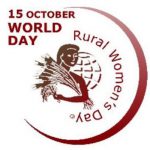 On Sunday 15th October, the world came together to commemorate the International Day for Rural Women. This year, the celebrations were focused on the theme, “Challenges and opportunities in climate-resilient agriculture for gender equality and the empowerment of rural women and girls”.
On Sunday 15th October, the world came together to commemorate the International Day for Rural Women. This year, the celebrations were focused on the theme, “Challenges and opportunities in climate-resilient agriculture for gender equality and the empowerment of rural women and girls”. Noting this year’s theme for the Day, which focuses on opportunities and challenges in climate-resistant agriculture, the head of UN Women called for more training and skills development for rural women and girls so that they can play a greater role in the development of green food and agricultural value chains.In addition, she highlighted the role that women farmers can play in protecting biodiversity through the use of indigenous crops and agro-ecological farming methods that are environmentally friendly and free of toxic chemicals.
 Rural women, the majority of whom depend on natural resources and agriculture for their livelihoods, make up over a quarter of the total world population. In developing countries, rural women represent approximately 43% of the agricultural labour force, and produce, process and prepare much of the food available, thereby giving them primary responsibility for food security.Bearing in mind that 76% of the extreme poor live in rural areas, ensuring rural women’s access to productive agricultural resources contributes to decreasing world hunger and poverty, and make rural women critical for the success of the new Sustainable Development agenda for 2030.
Rural women, the majority of whom depend on natural resources and agriculture for their livelihoods, make up over a quarter of the total world population. In developing countries, rural women represent approximately 43% of the agricultural labour force, and produce, process and prepare much of the food available, thereby giving them primary responsibility for food security.Bearing in mind that 76% of the extreme poor live in rural areas, ensuring rural women’s access to productive agricultural resources contributes to decreasing world hunger and poverty, and make rural women critical for the success of the new Sustainable Development agenda for 2030.
In Uganda, the picture is no different with four out of every five women in the country employed in agriculture. These facts go to show that women hold an important role in the production that fuels our economic growth and well-being. Although there have been efforts in enhancing gender equality in recent years, there are still many existing barricades that impede rural women’s economic and social empowerment that enhance their resilience to poverty, hunger and malnutrition.
Interestingly, the International Day for Rural Women is followed by World Food Day (16 October, themed, “Change the future of Migration: Invest in Food Security and Rural Development”) and International Day for the Eradication of Poverty (17 October) all of which are this year highlighting issues that are inextricably linked with rural women’s empowerment.